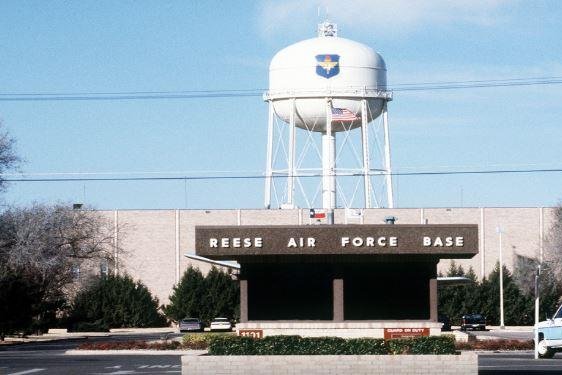Investigation of water-borne contaminants starts at former Reese AFB, Texas

Research began this week on carcinogens in ground water at the former Reese Air Force Base, Texas. Photo courtesy of U.S. Air Force
July 31 (UPI) -- Investigative field work began on contaminants in the groundwater of the former Reese Air Base, Texas, the U.S. Air Force said.
The base near Lubbock was closed in 1997 after a 50-year history. Like most U.S. air bases, it had relied since 1970 on foam, to put out fires, containing per- and polyfluoroalkyl substances [PFAS] regarded as hazardous materials. Repeated use of the foam led to contaminants seeping into ground water.

Research began this week on carcinogens in ground water at the former Reese Air Force Base, Texas. Photo courtesy of U.S. Air Force
July 31 (UPI) -- Investigative field work began on contaminants in the groundwater of the former Reese Air Base, Texas, the U.S. Air Force said.
The base near Lubbock was closed in 1997 after a 50-year history. Like most U.S. air bases, it had relied since 1970 on foam, to put out fires, containing per- and polyfluoroalkyl substances [PFAS] regarded as hazardous materials. Repeated use of the foam led to contaminants seeping into ground water.
Research has linked PFAS to kidney cancer, testicular cancer, and endocrine disruption. Unusual clusters of serious medical effects in communities with heavily PFAS-contaminated water, many near military bases, have been discovered.
The investigation was announced by the Air Force in a statement on Thursday.
The investigation was announced by the Air Force in a statement on Thursday.
RELATED Wind can carry PFAS pollution miles away from manufacturing facilities
"We didn't do this in neglect or violation of environmental laws," said Stephen TerMaath, chief of the Air Force Base Realignment and Closure Program Management Division. "For a lot of years we all understood this to be a safe product and used it in accordance with the manufacturer's instructions."
"Now, with the TCEQ's [Texas Commission on Environmental Quality] issuance of Protective Concentration Levels for 16 PFAS chemicals, the Air Force is taking aggressive measures to ensure the community has safe drinking water, and find long-term solutions to the contamination," TerMaath said.
The installation, in the next six weeks, of 25 monitoring wells in a 12 square-mile area near the former base is designed to provide a better understanding of water source areas and water migration.
RELATED Health-damaging PFAS 'forever chemicals' likely released at 2,500 sites
The Air Force said it has already sampled over 500 drinking water wells at or near the base, and installed 220 drinking water treatment systems of affected wells.
The Pentagon has identified 401 active and former military installations with known or suspected contamination. A 2019 bill requiring federal regulation the cleanup of PFAS on military bases was unsuccessful, leaving the matter to the states.
The Air Force said it has already sampled over 500 drinking water wells at or near the base, and installed 220 drinking water treatment systems of affected wells.
The Pentagon has identified 401 active and former military installations with known or suspected contamination. A 2019 bill requiring federal regulation the cleanup of PFAS on military bases was unsuccessful, leaving the matter to the states.
No comments:
Post a Comment